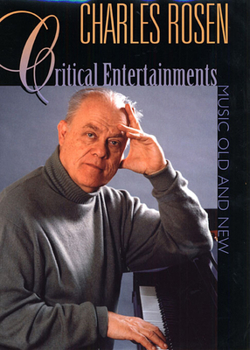Critical Entertainments: Music Old and New
Select Format
Select Condition 
Book Overview
An extraordinarily gifted musician and writer, Charles Rosen is a peerless commentator on the history and performance of music. Critical Entertainments brings together many of the essays that have established him as one of the most influential and eloquent voices in the field of music in our time.
Format:Paperback
Language:English
ISBN:0674006844
ISBN13:9780674006843
Release Date:November 2001
Publisher:Harvard University Press
Length:336 Pages
Weight:1.08 lbs.
Dimensions:0.9" x 6.2" x 9.0"
Customer Reviews
2 ratings
brilliant defense of difficult art
Published by Thriftbooks.com User , 23 years ago
Charles Rosen is a leading performer of the most difficult works of the 20th century avant-garde on piano (Elliot Carter, Anton Webern), as well as the classical repertory (Beethoven, Chopin), so he brings unique insight to his scholarship and writing on music. I enjoyed several of these essays tremendously, including "Radical, Conventional Mozart," and the piece on the problems with performing Carter's "Double Concerto" for piano and harpsichord. The essay "The Irrelevance of Serious Music," though, is not only brilliant, but should be widely popularized. The key is that Rosen writes from the perspective of the musician! He emphasizes that musicians will play music they are inspired by, even if only for one another. He presents many examples of music and musicians now established in the repertory that were initially rejected as "too difficult." But he also argues that an attempt to appeal to the lowest common denominator will not satisfy the serious listeners either -- they want to be challenged, at least up to a point. The reductio ad absurdum of commercialism, of course, is to eliminate "classical" music altogether, as the market is too small for a huge corporation to justify. (Rosen had a recording cancelled by Sony when he wrote a portion of this essay in the NYT criticizing the head of Sony for his obtuse commercialism.) Rosen concludes that "[a] work that ten people love passionately is more important than one that ten thousand do not mind hearing." Rosen provides support for my contention that books such as Libbey's "NPR Guide" do the public a disservice by excluding the leaders of the late 20th century avant-garde, including instead works that continue in the Romantic tradition. In Rosen's essay on Beethoven, he critiques a book by a sociologist. While I don't disagree with much here, I do think Rosen mainly takes on a strawman version of sociology. In the introduction he criticizes "[s]ociologists who believe that the history of music can be entirely elucidated by its social functions and the classes that support it without any reference to the music itself..." What I think Rosen misses is that the very process he describes so eloquently, the process of musicians shaping the reception of advanced works, is itself sociological! Becker's "Art Worlds" is a basic reference here, but the best book elaborating how music acquires meaning is Peter J. Martin's "Sounds and Society." Simon Frith's "Performing Rites" is good on how we make artistic judgements. Rosen is a graceful and compelling writer, and I recommend this book to anyone who enjoys serious music!
A MUST FOR ANYONE INTERESTED IN CLASSICAL MUSIC!
Published by Thriftbooks.com User , 24 years ago
To give a worthy review of this wonderful book would be to write 18 reviews, because every chapter deals with a different subject. There is something here for anyone and everyone who loves Classical music, including professional musicians, music scholars, and the general public. As always with this author, his impeccable music scholarship and insights are coupled with a clear prose style and commentary that is completely accessible to anyone. Topics range the full gamut of musical eras from Gregorian Chant through Baroque, Classical, Romantic, to Contemporary. The informative and aesthetically chosen chapter titles "speak for themselves": The Aesthetics of Stage Fright; The Discipline of Philology: Oliver Strunk; Keyboard Music of Bach and Handel; The Rediscovering of Haydn; Describing Mozart; Beaumarchais; Inventor of Modern Opera; Radical, Conventional Mozart; Beethoven's Career; Brahms: Influence, Plagiarism, and Inspiration; Brahms the Subversive; Brahms: Classicism and the Inspiration of Awkwardness; The Benefits of Authenticity; Dictionaries: the Old Harvard; Dictionaries: The New Grove's; The New Musicology; Schoenberg: The Possibilities of Disquiet; The Performance of Contemporary Music: Carter's Double Concerto; The Irrelevance of Serious Music. Each chapter in this book is filled with new and fascinating information that, although usually discussing music of the past, is also relevant to the 21st Century in which we now live. Charles Rosen's unique personal insights come from a life time of experience both performing and studying music that is exceptional in contemporary times. I found discussions of the careers and/or music of Bach, Handel, Beethoven, Mozart, Haydn, Schoenberg, and Carter very unique. The chapter concerning Brahms use of specific passages in pieces by Chopin and Beethoven as models for his own music was one of my favorites. The books concludes with a chapter about the state of serious music today relative to the negative influence shared by many directors of the record industry in their pursuit of fast profits without any concern for the future. I can't say enough about this wonderful book. Most highly recommended!





